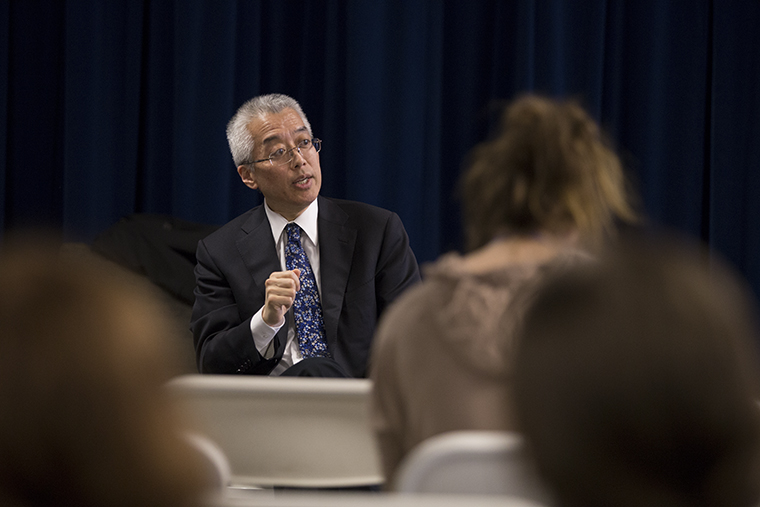Kim talks transparency, tuition
May 5, 2014

President Kwang-Wu Kim answered students’ questions at the fourth and final Coffee With the President forum of the academic year. The Student Govern- ment Association hosted the series to allow for students to voice their opinions and concerns directly to the president.
President Kwang-Wu Kim said during the final Coffee With the President forum on April 30, that he plans to curb tuition increases, facilitate budget transparency and emphasize the value of a Columbia degree.
Approximately 20 students at- tended the forum hosted by the Student Government Association where they sipped coffee, ate pas- tries and chatted with Kim about their financial concerns.
Kim said although Columbia’s tuition may rise in the future, he is planning to mitigate the increases as much as possible.
He said he sees a transparent budget in the college’s near future and that a Columbia degree is going to become more valuable because he is working to improve the col- lege’s professional reputation.
Kim said sharp tuition increases—like the 5 percent increase from the 2010–2011 academic year to 2011–2012—had a negative impact on the college’s retention rates and student enrollment. He also said he wants to increase scholarship sup- port for students.
Traditional higher education institutions tend to keep retention and enrollment high by raising their tuition prices and countering the added expenses with more student scholarship opportunities. However, Kim said implementing a similar model at Columbia would negate the college’s mission of diversity because it would only allow students who are not fazed by the steep tuition price.
“I think the [tuition model] is cynical and it negatively impacts our mission of diversity,” Kim said. “I wouldn’t want to make a steep increase of tuition prior to new students’ arrival.”
Kim said he delayed financial decisions this year because the col- lege does not yet have a permanent chief financial officer.
Once the college’s Provost designate Stan Wearden is in office and the college hires a permanent CFO, Kim said he will be able to start implementing changes discussed in previous forums and addresses, such as adding basic business education into the core curriculum, addressing the college’s communications system and focusing on fundraising. Students expressed interest in learning about the workings of the college’s expenses, which Kim said he is “all for.”
He said transparent budgets are a normal practice for traditional colleges, but without a permanent CFO it is difficult to make major financial decisions.
Interim CFO Richard Dowsek said students can see the college’s 990 financial statement, a form filed by tax-exempt organizations to provide the Internal Revenue Service and public with fiscal documents—total figures for do- nations, grants received, administrative staff members’ income and grant accessibility—to gain a better understanding of the college’s financial condition. Dowsek, Kim and students discussed creating a pie chart illustrating college ex- penses so students who may not be aware of the college’s inner-workings could better understand how Columbia’s finances work.
Kim also discussed improving the college’s reputation so current and prospective students can feel confident that a Columbia degree is worth the cost of tuition. To accomplish this, Kim said he plans to incorporate basic business education into the college’s current curriculum. Kim also wants to focus his attention on its core classes to better prepare students for jobs and flexible career paths.
Kim said the CFO would work on budget- ary and financial changes, whereas the pro- vost would handle academic changes.
“I don’t want to over-promise, but I feel really confident that we can make the [neces- sary] changes,” Kim said.
Deavondre Jones, a junior business & entrepreneurship major, said he was dis- appointed by the student turnout for what he thought was an important discus- sion. However, he did agree with Kim’s proposed changes, such as an improved college communications system and less drastic tuition hikes.
“I believe that the changes he is saying he will make would be considered great for people,” Jones said. “If [the changes are] done properly, there will be some great things in Columbia’s future.”
Mary Palmer, a graduate art education student and vice president of Columbia’s Art + Activism program, said she is optimistic about Kim’s plans but wishes there had been a more definitive timeline for the changes that Kim said he wants to implement.
“It’s a little disappointing because we go to these meetings and the things we are pro- posing, we won’t ever see because we will be gone,” Palmer said. Kim said he will continue the Coffee with the President series next year if invited by SGA, but he will shift his focus to other topics, such as fundraising.
“The president of the college is basically the chief fundraiser,” Kim said. “And I can’t make a dollar just sitting in my office.”







